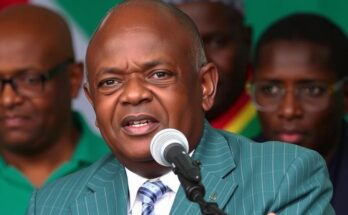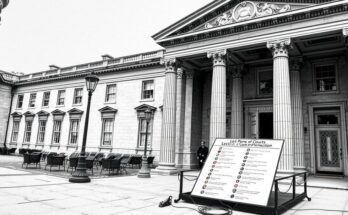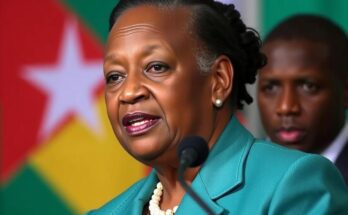Mauritius is holding parliamentary elections amidst concerns of electoral fraud and a phone-tapping scandal involving politicians and journalists. Prime Minister Pravind Jugnauth hopes for re-election after a significant diplomatic agreement with Britain regarding the Chagos Islands. However, public concerns about governance and civil liberties are mounting, raising apprehensions about the nation’s democratic integrity.
Mauritius is currently conducting parliamentary elections amidst a backdrop of concerns related to electoral integrity, as allegations of voter fraud loom over the process. On the day of the elections, police are deployed at polling stations to maintain order. These elections are particularly significant following a recent agreement which saw Britain relinquish sovereignty over the Chagos Islands to Mauritius, a diplomatic achievement that has heightened Prime Minister Pravind Jugnauth’s expectations for re-election. However, his campaign has faced significant challenges due to the emergence of leaked recordings involving politicians and journalists, raising suspicions about illegal surveillance practices. In light of the phone-tapping scandal, the authorities initially instituted a social media ban to prevent further leaks, although this decision was reversed due to public backlash. This incident has stoked fears concerning the erosion of democratic freedoms within Mauritius, a nation known for its stability and prosperity compared to its African neighbors. The election battle centers on two major parties: Jugnauth’s Militant Socialist Movement and the Alliance of Change, led by former Prime Minister Navin Ramgoolam, both vying for dominance in the 70-seat National Assembly. With more than one million registered voters participating, early turnout reports at noon suggested a 40 percent voter engagement, indicative of the public’s vested interest in the electoral outcome. Election Commissioner Irfan Rahman assured that measures are in place to ensure a transparent voting process. The country has hosted vibrant campaign rallies, showcasing a competitive political scene. However, concerns regarding the governance and increasing corruption over the last five years remain persistent issues among analysts and citizens alike.
Mauritius holds a unique position in Africa as a stable and economically prosperous democracy, having achieved independence from Britain in 1968. The recent agreement regarding the Chagos Islands represents a significant diplomatic milestone for the nation, influencing public opinion and political dynamics. Nevertheless, the country faces challenges including allegations of corruption and the mitigation of civil liberties, which has sparked public concern about the integrity of its democratic institutions. The electoral process remains central to Mauritius’ political landscape, reflecting the citizens’ aspirations for accountability and transparency in governance.
The parliamentary elections in Mauritius are pivotal amidst allegations of corruption and concerns over electoral integrity. The political atmosphere is charged with apprehensions stemming from past governance issues and the recent phone-tapping scandal. As political factions vie for control, the overarching call for transparency and accountability resonates with voters. The outcome of these elections may well determine the future trajectory of Mauritius’ democratic integrity and economic stability.
Original Source: www.bryantimes.com




